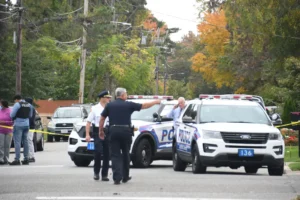Download the full report in Spanish
For tens of thousands of Dominican citizens of Haitian descent who are unable to get a national identity card, called a cédula, the future is worryingly uncertain.
Yafreisi is a Dominican of Haitian descent with who lives in Batey 8, a neighborhood built around a sugar mill that is now populated by the Dominican-born descendants of cane cutters who crossed the border to work on the Dominican mills. Without her cédula, Yafreisi’s dreams of attending university and pursuing a career are on hold, but what worries her more is how her lack of cédula affects her young daughter – “I dream […] that they don’t discriminate against her for not having [a cédula] as they are discriminating against me, that she doesn’t go through what I am going through.”
In September 2013, the Constitutional Tribunal of the Dominican Republic retroactively stripped hundreds of thousands of people born between 1929 and 2010 of their Dominican nationality in spite of the fact that these people were born in the Dominican Republic at a time when the Dominican Constitution guaranteed them birthright citizenship. Judgment 168-13 was criticized by local civil society and international human rights bodies as the culmination of a long history of racism and xenophobia directed against Dominicans of Haitian descent who form the overwhelming majority of the population affected by the court’s decision.
In response to the crisis created by the Constitutional Tribunal, the Dominican legislature passed Law 169-14 on May 23, 2014, promising to mediate some of the harsh effects of Judgment 168-13. For those like Yafreisi, who were born in the Dominican Republic and were officially registered as Dominican citizens prior to Judgment 168-13 (referred to as “Group A”), Law 169-14 was to restore their Dominican nationality and promised access to national identity documents — the tangible markers of Dominican citizenship. For those who were born in the Dominican Republic but were not officially registered as Dominican citizens prior to Judgment 168-13 (“Group B”), Law 169-14 offered them the option to register as non-citizens and pursue a path to naturalized citizenship, forcing them to self-report as foreigners in their own country.
Unfortunately for Yafreisi and her daughter, three years after the Dominican Congress passed Law 169-14, they, and many Dominicans of Haitian descent like them, still have not been able to have their citizenship recognized. Despite Law 169-14’s guarantee of restored nationality to those “luckier”citizens in “Group A,” thousands remain without the national identity documents that verify their Dominican citizenship. Without their cédula identity cards, these persons are unable to vote, hold public office, register their children in school, get health care, or access other basic services. As in Yafreisi’s case, many encounter trouble having their children’s Dominican citizenship recognized because of their own lack of documentation, meaning problems persist for the next generation and potentially for generations to come. For those in “Group B,” the violation of their right to birthright nationality remains unaddressed and the path to naturalized citizenship is still unclear.
This new report by American Jewish World Service, the Centro de Desarrollo Sostenible (Center for Sustainable Development, CEDESO for its acronym in Spanish), and Robert F. Kennedy Human Rights analyzes the ongoing violations of international human rights law in the Dominican Republic and provides the opportunity for Dominicans of Haitian descent who are affected by the country’s denationalization policies to speak about their feelings of fear and shame; the obstacles and discrimination they face from state authorities; and their still present but dim hopes for change. The co-authoring organizations offer recommendations to the Dominican government and the international community to ensure full restoration of the constitutional rights of Dominicans of Haitian descent.
The barriers “luckier”Dominicans of Haitian descent like Yafreisi and others in “Group A” continue to face underscore the acute need to eliminate the Dominican Republic’s denationalization policies. The Dominican government must ensure that the right to nationality of all Dominican citizens is recognized. Their ability to exercise their civil rights and their dreams depend on it.




